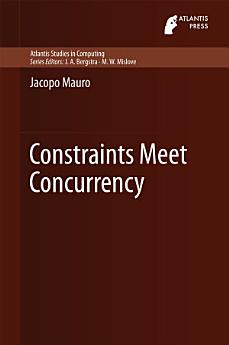Constraints Meet Concurrency
Jacopo Mauro
ফেব্ৰু ২০১৪ · Atlantis Studies in Computing কিতাপ 5 · Springer Science & Business Media
ইবুক
148
পৃষ্ঠা
reportমূল্যাংকন আৰু পৰ্যালোচনা সত্যাপন কৰা হোৱা নাই অধিক জানক
এই ইবুকখনৰ বিষয়ে
This book describes the benefits that emerge when the fields of constraint programming and concurrency meet. On the one hand, constraints can be used in concurrency theory to increase the conciseness and the expressive power of concurrent languages from a pragmatic point of view. On the other hand, problems modeled by using constraints can be solved faster and more efficiently using a concurrent system. Both directions are explored providing two separate lines of development. Firstly the expressive power of a concurrent language is studied, namely Constraint Handling Rules, that supports constraints as a primitive construct. The features of this language which make it Turing powerful are shown. Then a framework is proposed to solve constraint problems that is intended to be deployed on a concurrent system. For the development of this framework the concurrent language Jolie following the Service Oriented paradigm is used. Based on this experience, an extension to Service Oriented Languages is also proposed in order to overcome some of their limitations and to improve the development of concurrent applications.
এই ইবুকখনক মূল্যাংকন কৰক
আমাক আপোনাৰ মতামত জনাওক।
পঢ়াৰ নির্দেশাৱলী
স্মাৰ্টফ’ন আৰু টেবলেট
Android আৰু iPad/iPhoneৰ বাবে Google Play Books এপটো ইনষ্টল কৰক। ই স্বয়ংক্রিয়ভাৱে আপোনাৰ একাউণ্টৰ সৈতে ছিংক হয় আৰু আপুনি য'তে নাথাকক ত'তেই কোনো অডিঅ'বুক অনলাইন বা অফলাইনত শুনিবলৈ সুবিধা দিয়ে।
লেপটপ আৰু কম্পিউটাৰ
আপুনি কম্পিউটাৰৰ ৱেব ব্রাউজাৰ ব্যৱহাৰ কৰি Google Playত কিনা অডিঅ'বুকসমূহ শুনিব পাৰে।
ই-ৰীডাৰ আৰু অন্য ডিভাইচ
Kobo eReadersৰ দৰে ই-চিয়াঁহীৰ ডিভাইচসমূহত পঢ়িবলৈ, আপুনি এটা ফাইল ডাউনল’ড কৰি সেইটো আপোনাৰ ডিভাইচলৈ স্থানান্তৰণ কৰিব লাগিব। সমৰ্থিত ই-ৰিডাৰলৈ ফাইলটো কেনেকৈ স্থানান্তৰ কৰিব জানিবলৈ সহায় কেন্দ্ৰত থকা সবিশেষ নিৰ্দেশাৱলী চাওক।







